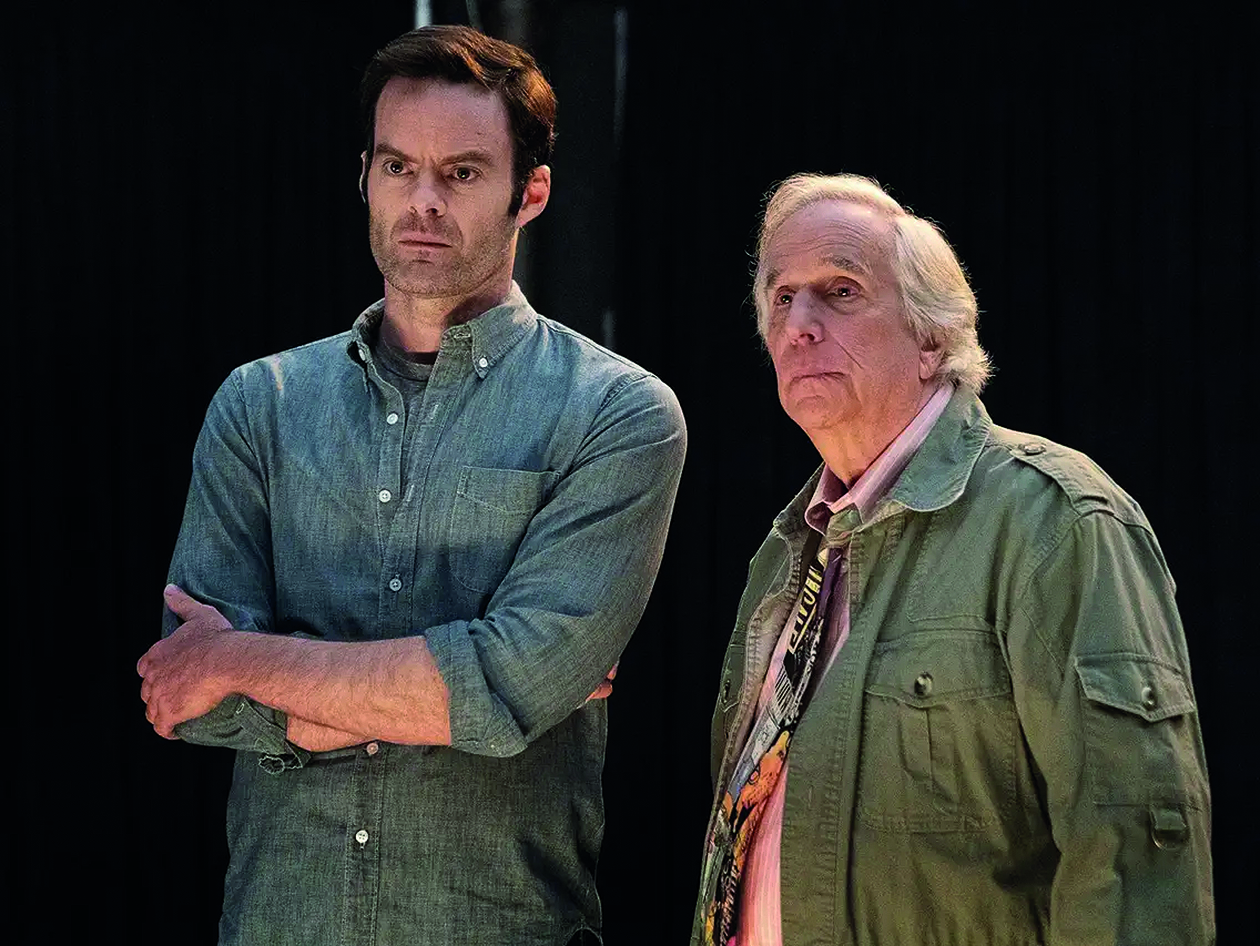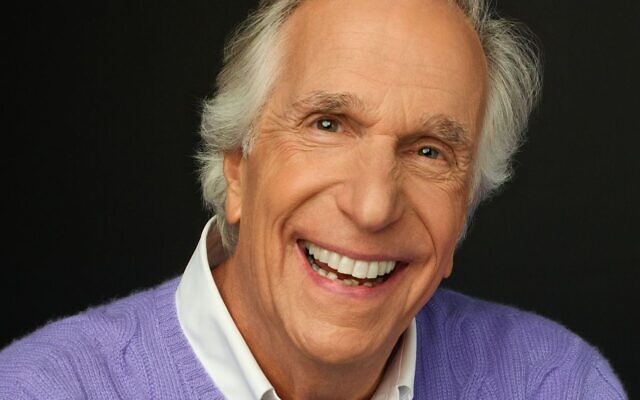‘Aaaay’ – look who’s back! The Fonz is on tour
Henry Winkler's new memoir is about finding fame and what happened afterwards and he's bringing it to a town near you
Had Henry Winkler’s parents not emigrated from Berlin in 1939 – pretending they were taking a business trip – we would never have had the Fonz. Or the series of compelling characters he would go on to play in later life, from the hapless lawyer in Arrested Development to the lousy acting tutor in Bill Hader’s Barry, plus much else besides. Within a few years of Harry and Ilse Winkler making a new life in Manhattan, most of their family back home had been murdered by the Nazis.
The Happy Days star didn’t have an easy relationship with his parents, as he describes in his candid and entertaining memoir, Being Henry: The Fonz… and Beyond, with which he’s touring the UK this summer. Not understanding Henry’s severe dyslexia (which wouldn’t be diagnosed until many decades later), his father often dismissed him as a “dummer hund” – a dumb dog.
The older man, who often struggled with debt, had wanted his son to go into the family business, the wood trade, and never appreciated Henry until he became famous. And it wasn’t until much later in his own life that Henry appreciated the impact of his parents’ experiences on their behaviour. That, of course, could warrant a whole other book.
Despite really struggling to read, Winkler studied acting at Yale and, after a spell on the New York theatre scene, got a small part in The Mary Tyler Moore Show. He moved to Los Angeles, sleeping on friends’ sofas, and success came fast.
Zooming from his Los Angeles home with his cherished dogs Sadie and Maisie snuffling about, the avuncular Winkler recalls how dramatically Arthur Fonzarelli changed his life.
“I went from walking down the street to buy a loaf of bread to not being able to walk down the street and having to have someone else buy it for me,” he says. “It happened so fast, and I really had to adjust to that, not allowing it to overtake me.”
 Becoming the object of widespread adulation was thrilling but odd. The book contains a very funny self-effacing anecdote about negative feedback he received after a one-night stand, and he describes his discomfort about how much better the ABC network was treating him than his co-stars. These, of course, included Ron Howard, now a big-name director, who later helped kickstart his acting career, as well as making him godfather to his daughter, Bryce Dallas Howard.
Becoming the object of widespread adulation was thrilling but odd. The book contains a very funny self-effacing anecdote about negative feedback he received after a one-night stand, and he describes his discomfort about how much better the ABC network was treating him than his co-stars. These, of course, included Ron Howard, now a big-name director, who later helped kickstart his acting career, as well as making him godfather to his daughter, Bryce Dallas Howard.
Fearing typecasting, Winkler turned down the role of Danny Zuko – later given to John Travolta – in Grease but, after Happy Days ended, and “jumping the shark” became a widespread euphemism for a creative project outlasting its quality, acting work dried up. To too many, he was the Fonz.
Throughout this time he has remained married to Stacey – a refreshingly loyal relationship by Hollywood standards.
He did a lot producing and directing, helping to create the successful MacGyver series, and a few smaller parts. Then, the greyer his hair got and the further away from Fonzy he looked, his acting career took an upturn. He jokes that he now does a good line in playing “authority figures who lack authority”.
With writer Lin Oliver, he developed the Hank Zipzer children’s books, about a charismatic dyslexic boy, and later starred in the CBBC adaptation.
A proud Jew, he’s conscious of the rise of antisemitism, he suggests it’s down to a human instinct always to find a scapegoat. “It is shocking that there has to be a boogeyman on which to place all of your personal hate and inability to enjoy life,” he says. “It’s amazing to me.”
Asked whether he feels a need to speak out, he says: “I speak out on being a human being. My metaphor is this: if there is a disaster, a war, a storm, a flood, you’re on your roof, and you have a bottle of water. You have your loved ones in tatters surrounding you and a truck or a boat is approaching the roof. Do you say, ‘Hold it, what is the colour of your skin? What’s your religious affiliation? Oh, you know what? I’m fine with my bottle of water, turn around and get lost.’
“We all need each other. When there is a disaster, I promise you no-one cares about anything except the rescue, and that simple concept has to be in the mix.”

He’s not particularly keen on being drawn further into a discussion about Israel, but has fond memories of visiting for the first time while appearing in Chanshi, the comedy series about a young New Yorker who moves to Israel.
“We had the best time, and I will say that Israel might be one of the most delicious countries I have been to. We had some of the greatest meals there, and people were lovely,” he says. “Soldiers stopped me and said, ‘When I was a little boy I read Hank Zipzer,’ but now there is this type of human being where their self-preservation is more important than a country’s survival.”
Henry Winkler never felt seen as a child, acknowledging this might have been behind his desire to become an actor. But he also warns of the dangers of believing the hype about oneself when enveloped by celebrity.
“You want so badly to believe that you are more than you are, but I did not grow an inch: I am still short,” says this sweet 78-year-old. “I did not get any smarter. I still can’t spell. If those things aren’t true, this other stuff cannot be true. So, you let other people believe it and you just say thank you.”
Henry Winkler is on tour from June 12 – July 3. He is appearing at the Barbican Centre, London, on 21 June.
@msashleydavies

Thank you for helping to make Jewish News the leading source of news and opinion for the UK Jewish community. Today we're asking for your invaluable help to continue putting our community first in everything we do.
For as little as £5 a month you can help sustain the vital work we do in celebrating and standing up for Jewish life in Britain.
Jewish News holds our community together and keeps us connected. Like a synagogue, it’s where people turn to feel part of something bigger. It also proudly shows the rest of Britain the vibrancy and rich culture of modern Jewish life.
You can make a quick and easy one-off or monthly contribution of £5, £10, £20 or any other sum you’re comfortable with.
100% of your donation will help us continue celebrating our community, in all its dynamic diversity...
Engaging
Being a community platform means so much more than producing a newspaper and website. One of our proudest roles is media partnering with our invaluable charities to amplify the outstanding work they do to help us all.
Celebrating
There’s no shortage of oys in the world but Jewish News takes every opportunity to celebrate the joys too, through projects like Night of Heroes, 40 Under 40 and other compelling countdowns that make the community kvell with pride.
Pioneering
In the first collaboration between media outlets from different faiths, Jewish News worked with British Muslim TV and Church Times to produce a list of young activists leading the way on interfaith understanding.
Campaigning
Royal Mail issued a stamp honouring Holocaust hero Sir Nicholas Winton after a Jewish News campaign attracted more than 100,000 backers. Jewish Newsalso produces special editions of the paper highlighting pressing issues including mental health and Holocaust remembrance.
Easy access
In an age when news is readily accessible, Jewish News provides high-quality content free online and offline, removing any financial barriers to connecting people.
Voice of our community to wider society
The Jewish News team regularly appears on TV, radio and on the pages of the national press to comment on stories about the Jewish community. Easy access to the paper on the streets of London also means Jewish News provides an invaluable window into the community for the country at large.
We hope you agree all this is worth preserving.






















